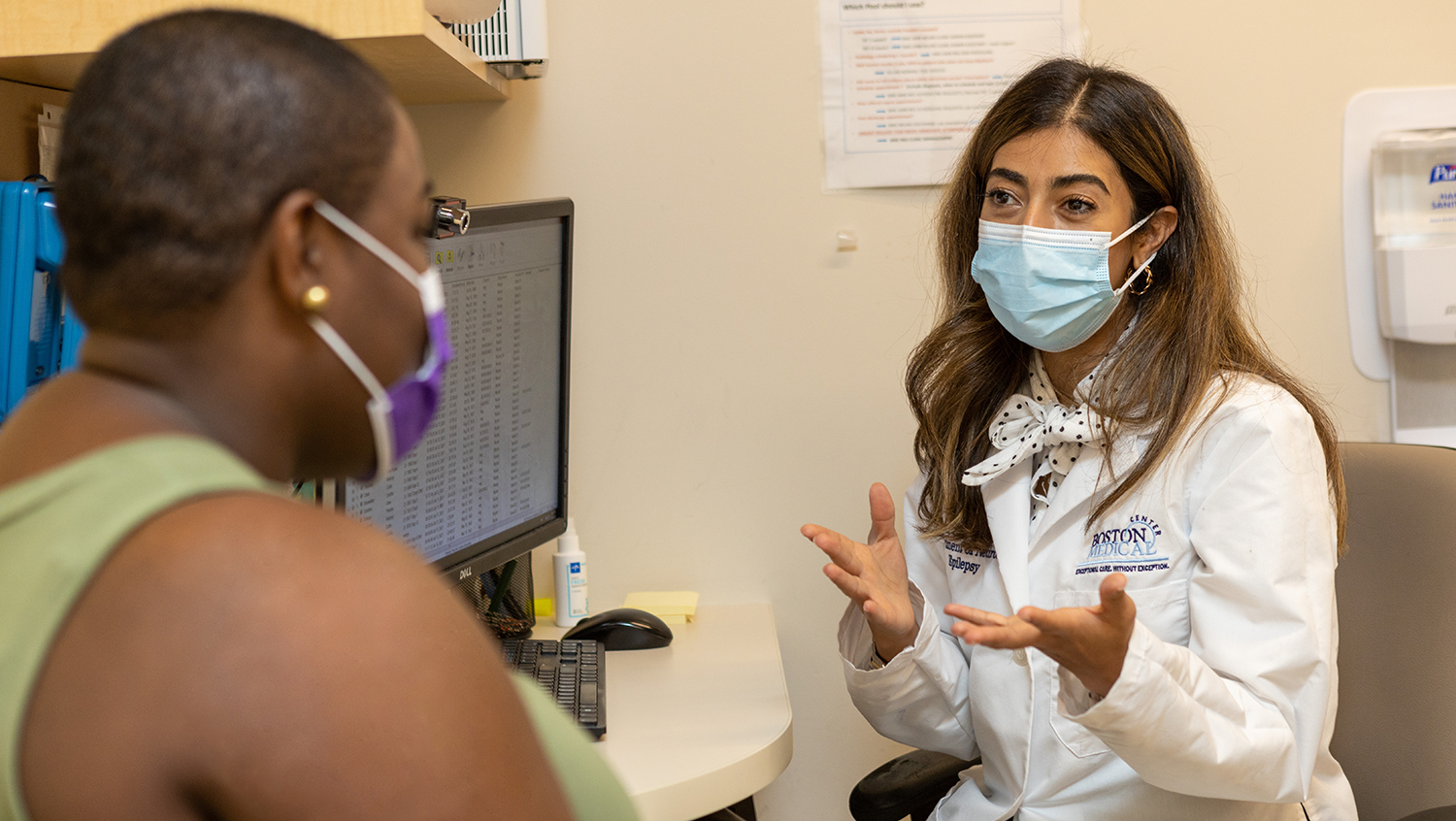What Does Ideal Healthcare for Girls and Women With Epilepsy Look Like?
November 18, 2021
By Meryl Bailey

Boston Medical Center
"There's power in knowledge," says Abrar Al-Faraj, MD, who spearheads BMC's Women with Epilepsy clinic, about empowering girls in their medical decisions.
Pregnancy can be a time of worry for all women. For women with epilepsy, managing their disease amid the fluctuating hormones of gestation can greatly compound concerns. A common neurological condition, epilepsy’s impact on women’s reproductive health is complex. Changes in hormone levels can be a factor in seizure frequency, and some seizure control medications, when taken during pregnancy, can cause cleft palate, neural tube defects, and other congenital disorders in their baby. But there are more than 30 antiepileptic drugs on the market today, some of which are used in combination. These medications will need to be carefully changed, monitored, and adjusted as necessary as women become pregnant, when they are postpartum, and during breastfeeding.
The bottom line? Women with epilepsy need special care and monitoring before, during, and after pregnancy.
“There are a lot of physiological changes that make women at higher risk of seizures during pregnancy and postpartum,” says Abrar Al-Faraj, MD, a neurologist specializing in epilepsy at Boston Medical Center (BMC).
With all of these changes, Al-Faraj often sees patients who are misinformed or unprepared for the process of their pregnancy while living with epilepsy. For example, she has seen patients who, with good intentions, stop their seizure medication abruptly when they discover they are pregnant, which can be dangerous for both mother and baby.
“Women with epilepsy have a higher risk of unplanned pregnancies because they either don’t use birth control or they use birth control that interacts with their seizure medicine.”
Al-Faraj believes multispecialty care coordination and providing education early, way before planning a family, is vital to help women successfully manage their pregnancies and optimize their health throughout life.
“I want patients who have new epilepsy diagnoses to be educated from the beginning, not when they are already pregnant and must know all of this information. There is power in knowledge,” Al-Faraj says.
Starting pregnancy and epilepsy education early
Women’s epilepsy clinics, like the one Dr. Al-Faraj spearheads at BMC, are emerging around the country to better address the unique health concerns of this subset of patients. The focus of these clinics is to educate women and tailor care and medications along a person’s reproductive span from puberty through menopause.
By starting the conversation around epilepsy and pregnancy early, Al-Faraj believes it will help patients feel more comfortable and less anxious if and when they do get pregnant. In addition, she notes that some patients are not as expressive or upfront about their worries and fears, and so by baking education into protocols for new epilepsy diagnoses, clinicians are able to be proactive in addressing concerns, instead of reactive.
“Being proactive is how we will improve their care,” she says.
Al-Faraj is working to educate primary care physicians and pediatricians in the hospital to refer teens and women patients soon after diagnosis or when new patients with epilepsy enter the health system.
Part of that approach, she notes, is to better counsel patients on contraception options and help avoid the complications that can arise during unplanned pregnancies.
“Women with epilepsy have a higher risk of unplanned pregnancies because they either don’t use birth control or they use birth control that interacts with their seizure medicine,” Al-Faraj explains. “They may also get pregnant on an unsafe-for-pregnancy drug that does not give me the window to change it, and then it’s very hard to get them off that medication.”
Addressing external barriers to epilepsy care
At BMC and other hospitals around the country, more patients face external barriers that hinder access to healthcare.
Low-income patients and patients with limited English proficiency face disparities in medical treatment and a disconnect to healthcare systems. For epilepsy patients—some who cannot drive or face unemployment because of their health condition—these struggles are amplified. These obstacles can contribute to social stigma. Specialty clinics should work to address these critical issues to improve care.
Ideally, Al-Faraj envisions introducing a social worker into the Women with Epilepsy clinic—and other similar clinic environments—to help patients navigate these barriers to care and address their social determinants of health. But it’s not just professionals that could help break down the walls; she also sees peer groups playing a vital role.
“Having a support group where women share their experiences and connect on these different issues is something that I’d love to have be part of the clinic. It would help them feel less isolated because there’s a lot of stigma around epilepsy, especially for our non-English-speaking patients,” says Al-Faraj.
The importance of coordinating care for women with epilepsy
Beyond the intricacies of medical treatment to control seizures, epilepsy can profoundly impact quality of life. According to the Centers for Disease Control and Prevention, adults with epilepsy report worse mental health, more cognitive impairment, and barriers in social participation. Al-Faraj believes these comorbidities can be more disabling than the seizures themselves.
“Seizures are unpredictable. That is severely anxiety-provoking. People with epilepsy definitely suffer from psychiatry morbidities, especially when they have difficulty with memory and concentration. And that adds to the cycle of depression and anxiety,” she explains.
The unpredictability of seizures can also result in life changes that perpetuate these mental health issues. After they are diagnosed, many patients can’t drive. And if their seizures are uncontrolled, they often can’t work many jobs. If they lose their jobs, Al-Faraj emphasizes, they lose their independence, which can definitely impact mental health.
Al-Faraj believes the future of healthcare for women with epilepsy centers on developing a care delivery model where clinics like hers can help serve as part of a medical home for women. A clinic that can provide specialized care for epilepsy while helping to refer patients to psychiatric support and work in tandem with primary care and high-risk obstetrics would better streamline education, support, and care for these medically complex women throughout their lives.
“I think my ideal would be that we would have a multidisciplinary clinic. One of the barriers for our patients is that it’s really hard for a mother to make it to the hospital,” Al-Faraj says. “She would ideally have a one-stop visit, where she comes and sees me, and then sees the epilepsy nurse for education, and then sees the OB, if she is pregnant, and a mental health practitioner. Streamlining and coordinating our care delivery is so important so she feels like a team is taking care of her.”
To refer a patient from Boston Medical Center or a network health center, use Epic to send an ambulatory referral to Neurology Epilepsy. Make sure to select the Women with Epilepsy clinic.
To refer from outside the BMC network, call the Neurology Department at 617-638-8456.


